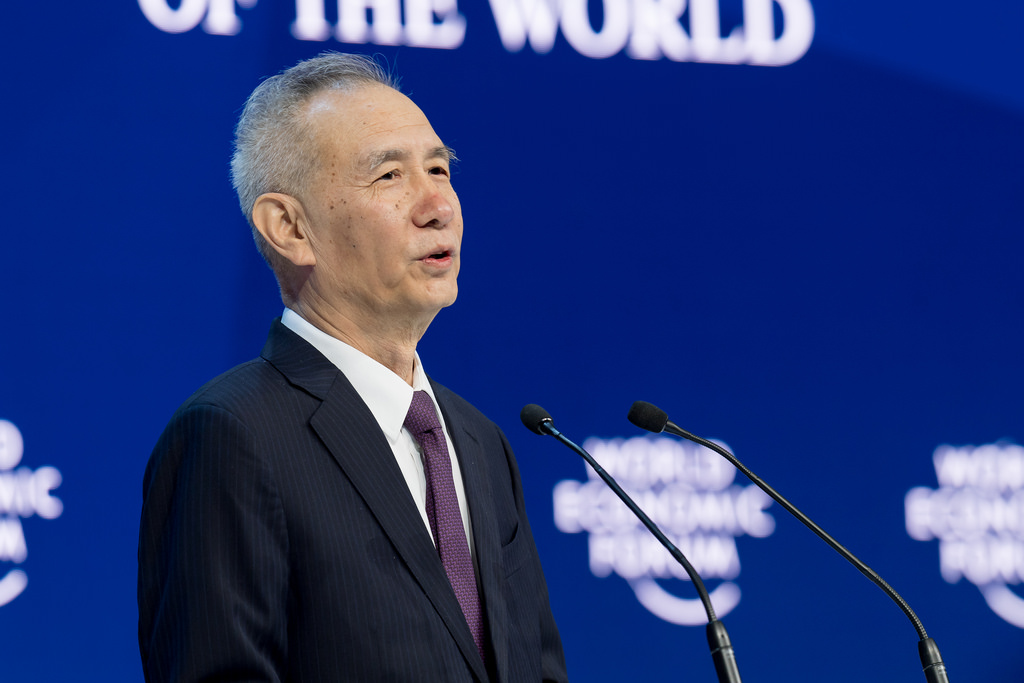SinoTech: Another Round of US-China Trade Talks, and Trump Gives ZTE a Break
U.S. and China Initiate Next Round of Trade Talks

Published by The Lawfare Institute
in Cooperation With

U.S. and China Initiate Next Round of Trade Talks
A Chinese trade mission arrived in Washington on Tuesday to kick off five days of negotiations with top U.S. officials. The Chinese mission will be led by Liu He, China’s vice premier and top economics official, while Treasury Secretary Steve Mnuchin will captain the U.S. team. American negotiators are expected to focus on reducing the U.S.-China trade deficit, one of President Trump’s major pledges during his 2016 campaign. The negotiations will be held under the shadow of U.S. tariffs against Chinese products, which could go into effect as early as next month. Public hearing on the proposed tariffs began this Tuesday, and will end on Wednesday.
Chinese and American negotiators, including Liu and Mnuchin, had already talked during trade discussions in Beijing earlier this month. During those negotiations, U.S. representatives reportedly demanded a $200 billion cut in the Chinese trade surplus with the U.S. by 2020, along with a drastic lowering of tariffs, advanced technology subsidies, and the removal of corporate foreign ownership caps. China countered with its own terms, asking the U.S. to drop a complaint over China’s licensing terms for foreign patent holders, give Chinese companies investing in U.S. counterparts a fair shake during national-security reviews, and call off the proposed tariffs. As the first round of trade talks wrapped up on May 4, Chinese state media released a statement indicating that both sides have reached “some consensus,” but that China and the U.S. remained “very divided” on other issues.
The relative intransigence of the two parties in Beijing worsened fears that the trade struggles between the United States and China are likely to stretch into the foreseeable future. Reports late last week suggested that Liu He may not even come to Washington if preliminary talks went poorly. Assuming the accuracy of that reporting, Liu’s arrival in Washington should be an encouraging sign that those talks achieved at least some progress—mostly likely through American pledges to remove sanctions on Chinese telecom ZTE.
Trump Promises to Relieve U.S. Sanctions on ZTE
The United States’ campaign against China’s tech industry took a surprising turn on Sunday, as President Trump tweeted a promise to bring ZTE “back into business, fast,” less than a month after the Commerce Department issued a denial order prohibiting ZTE from purchasing U.S. exports for seven years. Reuters reports that the move was prompted by the Chinese government’s refusal to engage in further trade talks until the sanctions were eased; it is likely to result in replacement of the denial order with a less restrictive form of sanction. In a separate tweet, the president stated that the relief was “reflective of a larger trade deal” his administration is negotiating with China, as well as his “personal relationship with President Xi.” Trump and Xi held a phone call concerning issues of mutual interest, including the ongoing trade tension, on May 8.
The decision created substantial confusion and outrage among many lawmakers from both parties, some of whom vehemently pushed back on Trump’s change of mind and pledged to continue congressional pressure, and one of whom even argued that Trump was violating the Constitution's emoluments clause by dealing with Beijing over ZTE. In Beijing, however, the decision was hailed by the spokesman of China’s Foreign Ministry, and appeared to precipitate the alleviation of measures taken against American companies and imports. On Monday, China’s Ministry of Commerce relaunched its review of U.S. chipmaker Qualcomm’s purchase of Dutch competitor NXP, and Chinese negotiators were reportedly willing to remove tariffs on U.S. agricultural products in exchange for relief for ZTE.
The announcement will have come as an existential relief to ZTE, which had been forced to halt main operations last week in response to the Commerce Department’s denial order. As much as a third of the components necessary for ZTE’s products are sourced from American suppliers, and enforcement of the denial order might well have spelled the company’s fate. The spokesman of China’s Foreign Ministry stated on Monday that Chinese officials were “currently in close communication with [American officials] on how exactly to implement” the alleviation of sanctions. The Commerce Department is now reviewing ZTE’s request for Commerce to stay the denial order; Secretary Wilbur Ross said Monday that the department would consider imposing other, assumably less restrictive, sanctions on the company.
In Other News
- The Pentagon, citing security concerns, banned smartphones and other devices from ZTE and compatriot Huawei from stores on military bases earlier this month. Australia’s Defense Department announced that it had stopped using Huawei and ZTE devices in February, and a bill pending before the House of Representatives would prevent the U.S. government from purchasing equipment made by either of those providers.
- On May 10, the White House hosted an Artificial Intelligence Summit to discuss AI regulation and policy, including best practices to support research and development, to remove barriers to AI innovation, and to enable high-impact, sector-specific applications of artificial intelligence. Officials from more than 40 companies—including Google, Goldman Sachs, and Boeing—attended the conference. The White House press office later published a summary of the summit, announcing the formation of an AI committee to advise White House and the federal government on artificial intelligence questions.
- The Chinese government has kept up its own AI push. On May 3, the Chinese Academy of Sciences released the country’s first cloud-AI chip with processing ability to support deep learning. On May 10, China’s State Administration of Cultural Heritage also announced a collaboration with internet giant Baidu to apply AI technology in several national museums. And on May 4, Baidu’s competitor Tencent led a $820 million investment into a robotics start-up UBTech, a Chinese firm specializing in making sophisticated robotic devices for home use.
- Tesla has registered a subsidiary in Shanghai to conduct research and development on electric cars and auto parts, according to a May 10 regulatory filing. Although the subsidiary will not be producing new cars, it was quickly perceived as Tesla’s attempt to establish a local Chinese partnership so that the company can eventually bring its vehicles into China without paying a standard 25 percent tariff.
Commentary & Analysis
Elsewhere on Lawfare, Dan Efrony suggests strengthening the international order governing cyberattacks, Herb Lin and Max Smeets interpret U.S. Cyber Command’s new “command vision” document, and Valentin Weber reviews Tim Maurer’s new book on state use of cyber mercenaries. This week’s Cyberlaw Podcast kicks off with a discussion of President Trump’s promise to alleviate sanctions on ZTE before exploring how the 2019 National Defense Authorization Act may impact military purchases from Chinese telecoms. Last week’s episode also discussed recent measures against the Chinese telecoms, including the possibility of additional Section 301 restrictions. (The relevant discussion begins at 21:30). At Just Security, Ken Anderson discusses how AI may impact China and Russia’s use of cyberattacks or other ‘liminal’ forms of conflict, and Michael Schmitt writes “In Defense of Sovereignty in Cyberspace.”
At the Center for Strategic and International Studies, Scott Kennedy warns that trade talks are unlikely to solve differences in the American and Chinese trade positions easily or quickly. At the Council on Foreign Relations, Brad Setser analyzes the future of the “Made in China 2025” plan and China’s trade debt. At New America, Rogier Creemers explains some common misconceptions about China’s “social credit system,” and Creemers, Graham Webster, and Paul Triolo provide a translation of the principles for Internet associations proposed last week by the industry-heavy China Federation of Internet Societies.
In the Financial Times, Martin Wolf argues that President Trump's ambitious demands from China will stymie further progress. Jennifer Rubin of the Washington Post and James Freeman of the Wall Street Journal argue that President Trump is giving up the bargaining chip of sanctions against ZTE too easily. At Foreign Policy, Sharon Weinberger examines the export dominance of China’s Drone industry. For Bloomberg, Adam Minter argues that attempts to prohibit industrial espionage by restricting Chinese researchers would miss the mark.




.png?sfvrsn=2f011ea5_5)

